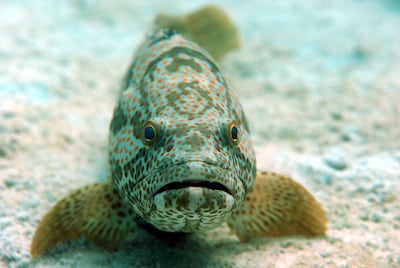Marine life in the Arabian Gulf risks being devastated due to overfishing, a major new study has found.
Scientists behind the global analysis bracketed much of the waters off the UAE into one of the highest categories for “unsustainable harvesting”.
Officials in the Emirates said the research backed up their own findings that only a small proportion of fish landed in Abu Dhabi are from species being caught in sustainable numbers.
However, experts also said some over-fished species are showing signs of recovery, and efforts to preserve marine species are being stepped up through a ban on the use of gargoor fishing traps.
Published in the American journal Science Advances, the new research divided the surface of the earth into squares and, in each one, looked at how many species are at risk of being unsustainably harvested.
Almost the whole of the Arabian Gulf - along with the waters in the Gulf of Oman off the UAE’s east coast - is classified as being in the top 10 per cent of most at risk areas in the world.
The study’s lead author, Dr Enrico Di Minin, of the Department of Geosciences and Geography at the University of Helsinki in Finland, said unsustainable fishing was the “single biggest threat” to marine species.
In the Arabian Gulf, sharks and fish are the key species of concern, said Dr Di Minin, adding that the introduction – and enforcement – of “sustainable measures” was needed for species to recover.
“If it’s a species that is a commercially used food resource, that food resource will be disappearing. Sustainable actions should be implemented quickly,” he said.
Ahmed Al Hashmi, acting executive director of the terrestrial and marine biodiversity sector at the Environment Agency Abu Dhabi (EAD), said a key measure to consider was the proportion of food species that were being “sustainably harvested”.
“This [indicator] confirms exactly the findings in the scientific article, that only a marginal portion of Abu Dhabi landings consist of sustainably exploited species,” said Mr Al Hashmi.
Since 2002, EAD has monitored the conservation status of 28 harvested species, of which 12 are “over-exploited” and three “severely over-exploited”.
“It is not coincidental that the 12 over-exploited species are also commercially the most popular species,” he said, citing examples such as hamour, shaari and farsh. Adult populations of hamour have reportedly fallen by 90 percent.
However, Mr Al Hashmi said that recent population studies on the three species indicated “a positive but slow recovery”, and that EAD was “committed to reverse the trend of stock depletion”.
In 2015, along with the Ministry of Climate Change and Environment, it launched the UAE Sustainable Fishing programme, which aims to reach sustainable fishing levels by 2030.
The ban on gargoor traps - steel mesh traps placed on the sea floor - was “a far-reaching and significant step to restrict the practice of unsustainable fishing”, according to Mr Al Hashmi.
It came into effect on May 1.
Gargoor traps have been criticised for being non-selective, since they catch a wide range of species, including non-target fish. Mr Al Hashmi also said they were the main method of catching some of the over-exploited species living close to the sea floor.
Other measures to conserve marine life in Abu Dhabi waters include a proposal to restrict spearfishing.
The paper which Dr Di Minin co-authored was written by 11 scientists in eight countries, including Australia, Finland, Switzerland and the United Kingdom. Overall, Asia was highlighted as having the areas at highest risk from unsustainable sea fishing.



